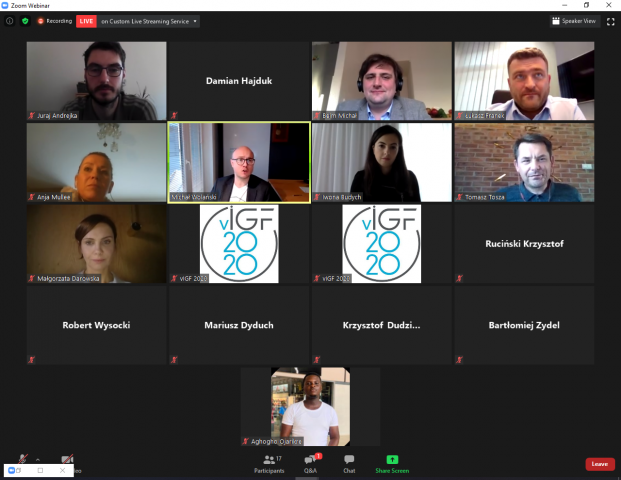Session
1. Opening presentation 14:00 CET - 15 mins
2. Panel session - part 1 14:15 CET - ~20...30 mins
3. ...switching to brainstorm-like with highly encouraged & motivated publicity and returning to the panel ~20...25 mins
4. Panel session - part 2 15:05 CET - ~15 mins
5. Final summary 15:20 CET - 10 mins
Panelists:
- Juraj Andrejka - HoppyGo
- Michał Beim - Poznań University of Life Science
- Małgorzata Darowska - Ministry of Infrastructure (PL)
- Łukasz Franek - city of Kraków, Transport Management Unit
- Anja Mullee - independent consultant for transport industry
- Tomasz Tosza - city of Jaworzno, Transport Management Unit
Moderators:
- Iwona Budych
- Damian Hajduk
- Michał Wolański
Reporter:
Damian Hajduk
Organizers:
TCT - Transport Consultants Team
[ Main topic ] Transport in metropolitan areas in face of challenges and possibilities of the 21st century.
- Viewpoints of different groups of users to gain most optimal solutions (for them)
- Neccesity to keep effective governance of the city and metropolitan area
- Possibities to elaborate and implement most optimal solutions
[ Goal ] 21st century with its wealth, knowledge and technology could way more support the cities (and metropolitan areas) to perform better. But how?
[ Topics / questions ]
- When (public) transport is so COOL and cars are so EVIL, why many people use them so much?
(are they some bad people maybe :)) ?So perhaps let's serve this evil cars in an integrated journey path as well? (mobility as a service) - Planning&organization development vs technology development. Which is more important? Is at least some integrated planning for transport (e.g. integrated multimodal plan - IMP) necessary or even unavoidable?
- There are technical possibilities to make transport integrated. Why not use them?
- Well, maybe instead of improving mobility shall we limit the unnecessary one? (15 minutes city, im-mobility as a service)
- Will the switch-to-remote work tendecy limits demand on transport? (im-mobility as a service) Will the metropolitan areas also decline?
- Will drones save us? Will they bypass the traffic or help to limit the traffic? How much and when?
- What shall provide us the "service level" of a smart metropolitan area as the result of good policy-making:
- minimum amount of transport means on a route per day guaranteed?
- minimum commercial speed of (e.g) 15 kmh door-to-door within the metropolitan area guaranteed?
- everyday basic needs available within 15 mins range / ~ walking range (15 minutes city, im-mobility as a service)?
...and maybe something more.
So, would you join us to discuss how to find best solution on a countinous way (sometimes painful but overall promising) of improvement?
See you on the session!
Ps. Questions / propsals? Contact us!.
Report
( work in progress )
Transport system needs simplification and openness - in terms of technical layer (infrastructure, data management) and organization layer. Integrated planning seems to be necessity, as transport, infrastructure and spatial planning are in strong interference with each other and thus interdepenedent.
Panelists:
- Juraj Andrejka - HoppyGo
- Michał Beim - Poznań University of Life Science
- Małgorzata Darowska - Ministry of Infrastructure (PL)
- Łukasz Franek - city of Kraków, Transport Management Unit
- Anja Mullee - independent consultant for transport industry
- Tomasz Tosza - city of Jaworzno, Transport Management Unit
Moderators:
- Iwona Budych
- Damian Hajduk
- Michał Wolański
Reporter:
Damian Hajduk
There is no any doubt that transport services should be open and democrative to everyone with respectful manner. Therefore gender issues were not topic of our discussion.
( work in progress )

( work in progress )